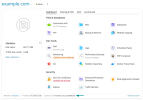- Server operating system version
- Debian 12.10
- Plesk version and microupdate number
- Plesk Obsidian 18.0.68 Update #2
I have a website on my server where I had to upload a new httpdocs folder. I renamed the old folder and then uploaded the new folder. All went well until I loaded the (new) website in a browser only to find that my old index.php was shown. On inspection I discovered that the file permissions for this file were set to 0444 and a big section of hex code was added at the start of the file (presumably the old index.php page). It also changed the permissions on my .htaccess file to 0444. I cannot change the permissions on these files and if I delete them and upload replacements the same thing happens.
Anyone have a clue as what is happening and how to solve the problem?
Anyone have a clue as what is happening and how to solve the problem?

